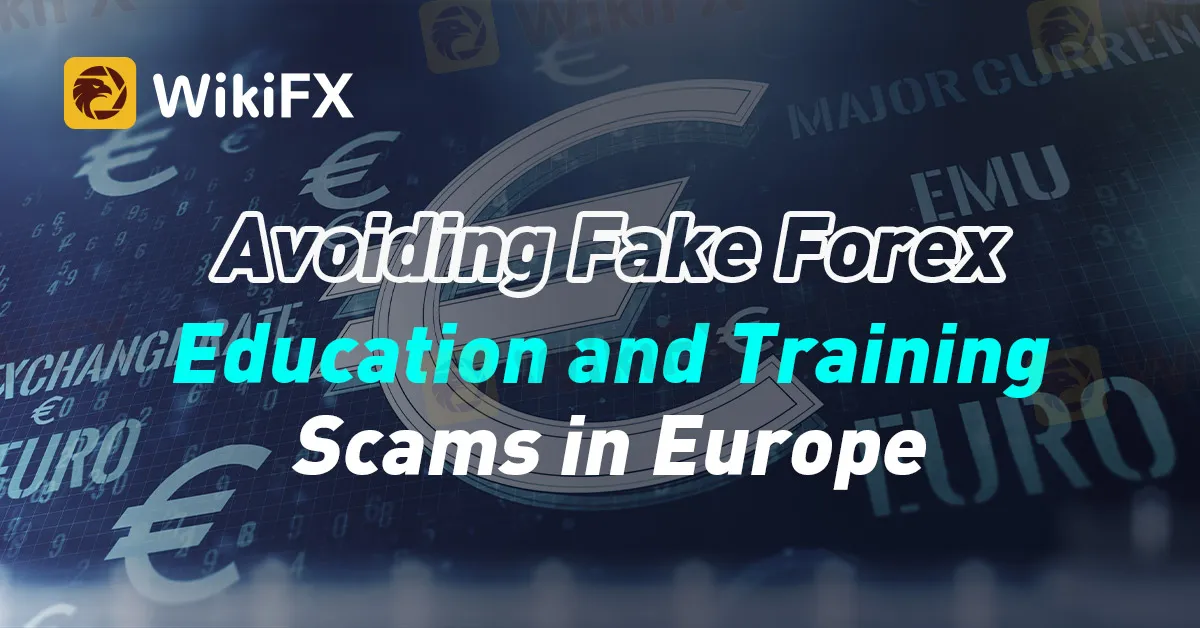简体中文
繁體中文
English
Pусский
日本語
ภาษาไทย
Tiếng Việt
Bahasa Indonesia
Español
हिन्दी
Filippiiniläinen
Français
Deutsch
Português
Türkçe
한국어
العربية
Avoiding Fake Forex Education and Training Scams in Europe
Abstract:Education and training are crucial for traders to develop their skills and succeed in the forex market. However, there are fraudulent entities that offer fake education and training programs, preying on traders' desire for knowledge. In this article, we will discuss how to recognize and avoid fake forex education and training scams in Europe.

Education and training are crucial for traders to develop their skills and succeed in the forex market. However, there are fraudulent entities that offer fake education and training programs, preying on traders' desire for knowledge. In this article, we will discuss how to recognize and avoid fake forex education and training scams in Europe.
Accreditation and Reputation
Genuine education providers often have accreditation from recognized institutions or affiliations with reputable organizations. Verify the credentials and reputation of the education provider before enrolling in any program. Look for reviews and feedback from past students.
Unrealistic Claims
Be cautious of education providers that make extravagant claims about guaranteed profits or quick success. The forex market is complex and requires time, effort, and experience to master. Legitimate providers emphasize realistic expectations and provide a comprehensive education.
Free vs. Paid
While some legitimate providers offer free educational resources, be cautious of entirely free courses that promise to make you an expert trader. Quality education often requires investment. However, research and ensure that the fees are reasonable and commensurate with the value provided.
Course Structure and Content
Evaluate the course structure and content before enrolling. Legitimate providers offer a well-structured curriculum that covers various aspects of forex trading, including risk management and technical analysis. Fake education programs may lack depth or provide outdated information.
Conclusion
Protect yourself from fake forex education and training scams by conducting thorough research, verifying accreditation and reputation, and critically evaluating the course content. For reliable information and resources on forex education, consider visiting WikiFX at www.wikifx.com. They offer comprehensive insights into education providers, helping traders make informed decisions and avoid falling victim to fraudulent schemes.

Disclaimer:
The views in this article only represent the author's personal views, and do not constitute investment advice on this platform. This platform does not guarantee the accuracy, completeness and timeliness of the information in the article, and will not be liable for any loss caused by the use of or reliance on the information in the article.
Read more

Anti-Scam Groups Urge Tougher Action on Fraudsters in UK
Anti-scam groups demand tougher police action on fraudsters as UK fraud rates surge 19%, targeting millions in a penalty-free crime spree exposed by a $35m scam leak.

Philippines Deports 29 Indonesians Linked to Online Scam Syndicate in Manila
Online scam groups in the Philippines trick Filipinos into gambling and love scams, from Manila to Bacolod, causing trafficking and pain as police fight back.

CySEC Warns Against 14 Unlicensed Investment Websites
CySEC urges caution as 14 websites lack proper authorization.

Couple Arrested in Thailand for Billion-Baht Crypto Scam & International Kidnapping
Thai authorities have announced the arrest of 27-year-old Chinese national Wu Di, who is believed to be at the centre of a large-scale cryptocurrency investment scam that has defrauded victims of over 600 million baht (approximately US$17.7 million) within a span of just two months.
WikiFX Broker
Latest News
How Crypto Trading Transforms FX and CFD Brokerage Industry
UK would not hesitate to retaliate against US tariffs - No 10 sources
FCA Warns Against 10 Unlicensed or Clone Firms
CySEC Warns Against 14 Unlicensed Investment Websites
Top Currency Pairs to Watch for Profit This Week - March 31, 2025
Will natural disasters have an impact on the forex market?
Philippines Deports 29 Indonesians Linked to Online Scam Syndicate in Manila
Navigating the Intersection of Forex Markets, AI Technology, and Fintech
Exposed: Deceptive World of Fake Trading Gurus – Don’t Get Fooled!
AI-Powered Strategies to Improve Profits in Forex Trading
Currency Calculator







